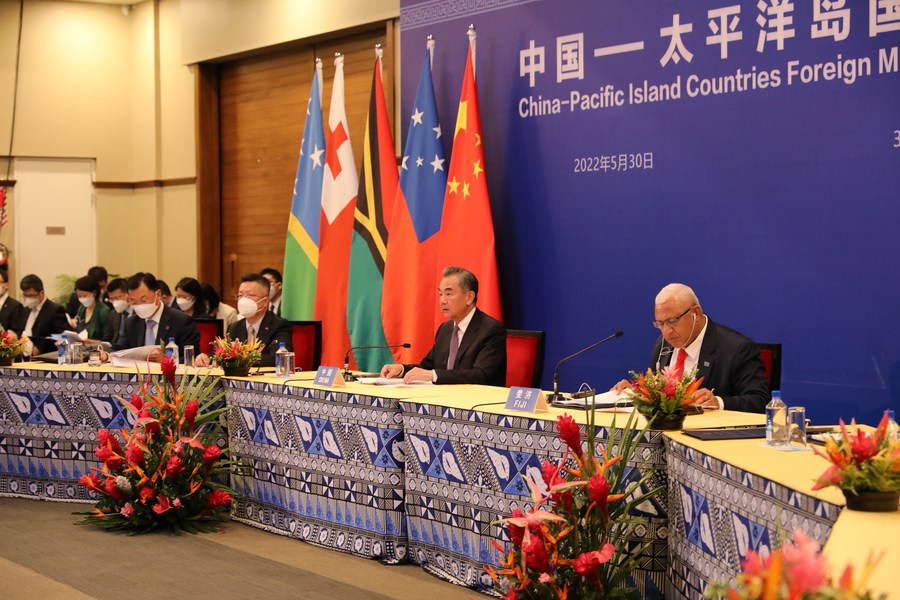2022年6月3日,华东师范大学外语学院国别与区域研究所副所长、亚洲和太平洋地区研究中心执行副主任陈晓晨接受《人民日报》英文客户端采访,谈第二次中国—太平洋岛国外长会的成果,以及中国尊重太平洋岛国基于协商一致的“太平洋方式”与西方的“势力范围思维”形成鲜明对比。
Beijing (People's Daily) - Chinese State Councilor and Foreign Minister Wang Yi is on a 10-day visit to Pacific Island countries. Analysts told the People’s Daily that China seeks common development, not a “sphere of influence,” in its cooperation with the Pacific Island nations.

Chinese State Councilor and Foreign Minister Wang Yi co-host the second China-Pacific Island Countries Foreign Ministers' Meeting with Fijian Prime Minister and Foreign Minister Josaia Voreqe Bainimarama in Suva, capital of Fiji, May 30, 2022. (Photo: Xinhua)
China and Pacific Island countries have reached a five-point consensus, including deepening their comprehensive strategic partnership, at the Second China-Pacific Island Countries Foreign Ministers’ Meeting held on Monday.
At the press conference after the ministers’ meeting, Wang advised some people not to be too anxious or nervous, in response to voices questioning why China is so actively supporting and helping South Pacific Island countries.
China’s diplomatic focus is on common development, and China neither imposes anything to another sovereign state nor targets third parties, a key characteristic that China’s diplomacy differs significantly from the West, said Shen Yujia, an associate researcher at the School of International Relations in Sichuan University.
When advancing cooperation with other countries, China does not take geopolitical needs as the starting point, but strives to achieve win-win results, said Shen.
Wang’s statement showed that China faces up to the fact that some Pacific Islanders are concerned that closer cooperation with China might incur increased Western geopolitical competitive measures in the region, said Chen Xiaochen, deputy director of Centre for Asia Pacific Studies at East China Normal University.
Despite the difficulties, China will be creative in advancing cooperation with its Pacific Island partners on the premise of equality and mutual respect, said Chen.
From China-Pacific Island countries relations, all countries should realize that there can be a cooperation model of equality, mutual benefit and mutual respect between big and small nations, instead of seeking to treat other countries as their “sphere of influence,” the analyst stressed.
Some Western media focused on the joint document that was not finalized, saying China “falls short” on cooperation with Pacific Island nations. Experts said that the conversations between the two sides have yielded fruitful results, and the process showed China’s respect to its Island partners.
China pledges to continue fostering the six new platforms of cooperation with Pacific Island countries on poverty reduction, climate change, disaster prevention, agriculture and the Juncao technology center.
China-Pacific cooperation has significantly deepened, with more comprehensive, diverse and complex issues, and thus it does have difficulties in making such a comprehensive pact that all countries agreed to, Chen explained, who also mentioned inevitably greater external pressure as more and more parties are involved in China-Pacific cooperation.
China has adhered to the principle of joint consultation and contribution and fully respected the “Pacific Way” long cherished by the Pacific Islanders—that is, discussions are conducted according to the principle of consensus, and even if only one country has doubts, it will continue consultations for consensus-based agreements, Chen pointed out.